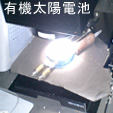
For those who are applying a graduate school, we highly recommend venturing into the challenging a new research field.
Organic electronics is one of the most rapidly rising field. You could find a lot of oppotunities to achieve great breakthrough for future industry based on your original idea. Many students having various background such as chemistry, electronics and physics are studying in our laboratory. They are learning and teaching complemental disciplines each other because the knowledge in wide variety of science is required for organic electronics. You can start studies with your own experties and willingness to learn.
To enter the Department of Applied Science for Electronics and Materials, applicants can take an exam after selecting either chemistry/materials or electrical fields. The Fujita Laboratory accepts both students.
For students majoring in chemistry or materials

Development of high performance materials and control of the molecular arrangement are the key for organic devices. At the Fujita Laboratory, we aim to create new materials and method to control the arrangement. We welcome those who like organic synthesis and molecular organization.
For students majoring in physics or electronics

Organic semiconductors are just applied to real devices such as OLED displays. The atomosphere of the research field is filled with vital and frontire spirits like the early stage in development of silicon devices. We welcom those who like new device development in the new field.
Introduction of Laboratory
Characteristics of Fujita Laboratory
This laboratory consists of members having various background such as organic chemistry, materials chemistry, electric, electronics, condensed matter phisics and pcosess systems.We conduct a diversified research aiming at developing organic electronics. We have developed high performance organic light emitting devices, organic thin film solar cells, flexible transistors and organic resistive memory under a lot of collaboration with device manufacturers, materials suppliers and process machinery manufacturers.
Research Contents
 organic flexible display (sony)
organic flexible display (sony)
We conduct R&D to pioneer the organic electronics including organic light emitting devices, organic photovoltaic cells, organic transistors and organic memories. Since the research field of organic electronics is still in very early stage of development, they have not yet established either 1)device structure, 2)materials and 3)fabrication process. We need to explore from those three aspects scomprehensively because three aspects are highly interdependent. In Fujita lab. we focus on the development to realize low-cost and large-area devices which is the largest advantage of organic electronics.
Education policy
To foster researchers and engineers conducting R&D autonomously, students are encouraged to explore their research subjects through lively discussion in the free atmosphere. Students with various backgrounds ,work together towards a common goal while utilizing their expertise to grow to researchers and engineers with practical skills and broad perspective.
Events and Seminars
Once in a semester
Progress report (oral presentation)
Every week, we have
- Lunch meetings (Monday lunch time)
- Group meetings (oral presentation style, using a projector)
- Journal readings (introductions of the latest theses)
- Study workshops (to acquire basic knowledge)
We also have parties to celebrate each important occasion.










